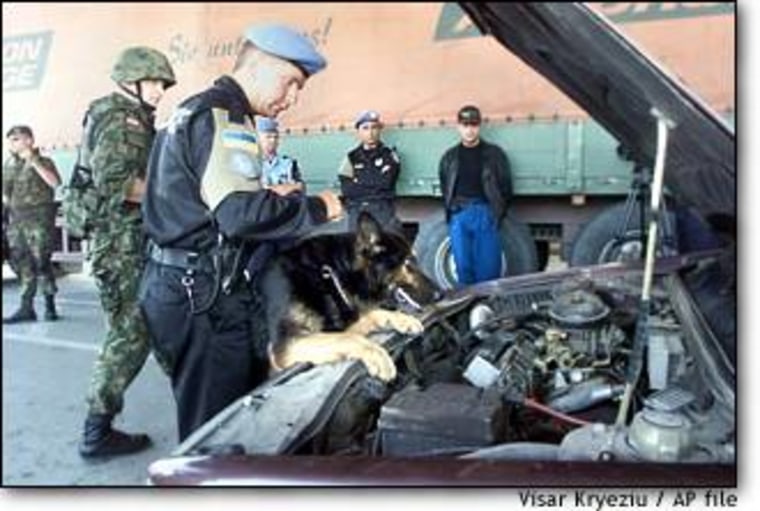The roads of impoverished southeastern Europe are paved with profits for anyone willing to smuggle cigarettes and liquor, kidnap women for sex slavery or move drugs from country to country.
It takes four hours to travel 60 miles of pitted and narrow roads from Albania’s capital, Tirana, to the border with Montenegro. A small-time Albanian smuggler carrying contraband liquor hidden in a large compartment beneath the trunk of his car pauses at the frontier post of Han i Hotit to bribe a customs guard, then drives on 10 miles to a courtyard in Tuzi, Albania, where he deposits his goods.
“Everybody does it,” he explains to his passenger. “Look over there at Shkoder Lake; there are dozens of boats carrying contraband.”
On a broad plain south of Tuzi lies a sprawling, ramshackle refugee camp next to the huge city dump. Traffickers in sex slaves hold girls kidnapped from as far away as Romania here before they are shipped across the Adriatic to Italy, according to the Albanian Interior Ministry.
Albania to Montenegro
In neighboring Montenegro, in the restaurant of Podgorica’s premier hotel, the Crna Gora, three South Americans are dining. “Narcotics,” a waiter confides. “They’ve been here a long time.”
The Podgorica bus station is jam-packed at 9 p.m., and the bus to Bosnia is full. For a $25 bribe, the driver accommodates an extra traveler in a jump seat.
The bus climbs the Black Mountains that give Montenegro its name on a route used for centuries by armies and bandits, and today, smugglers. It wends its way over precipitous passes under a full moon to yet another border, this one guarded by bored NATO soldiers in jeeps who are on the lookout for rebel attacks. They are not there to interdict contraband.
Slave network
A world away and farther east in the Romanian capital of Bucharest, a young man who serves as a middleman for several gangs who operate a forced prostitution ring tells of the rackets that provide traffickers with unsuspecting women.
“There are ‘agencies’ that sell ‘dancers’ to Albania, Japan, Israel, Greece, Turkey,” the middleman says in a midnight interview in an apartment house. “Women sign a ‘contract’ with a so-called impresario, who has them photographed for an album — 1,000 of them per album. But it is only for prostitution. Then they disappear. They are sold for 2,500 Deutsche Marks.”
“Mothers ask the cops to locate their daughters,” the middleman continues. “But permission has already been given for their export by the state police. It costs $50,000 to open such an ‘agency,’ paid to cops.”
“Bucharest is headquarters for these operations, but there are branches in Moldova, Ukraine and Russia,” the middleman says. “One has a reservoir of 4,200 girls. They also sell them by videocassette. You choose No. 7, No. 18. If they don’t get picked, then they are sent to Oradea on the Hungarian border to a Turk. ... He works with a Hungarian on other side. They travel in big trucks. They use ex-soccer stars to smuggle women. Then the traffickers pay $500 per fake Hungarian passport.”
David Binder covered the Balkans for The New York Times starting in 1963. He continues to travel in and report on the region.
